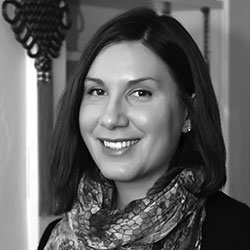
Sleep Essentials You Need to Know
February 3, 2016
As part of an ongoing series on The Box, NYIT health and medical experts share tips and information about the services offered at NYIT Center for Sports Medicine in the Academic Health Care Center on the Old Westbury campus. Up next: sleep tips from an occupational therapist.
When Assistant Professor Melanie Austin-McCain (B.S. '00), O.T.D., discussed healthy sleep routines at NYIT Center for Sports Medicine's recent Wellness 101 seminar, she cited this statistic: A person awake for at least 17 straight hours has fatigue symptoms that mimic those of someone with a blood alcohol level of .05. The number comes from a study in the journal Occupational & Environmental Medicine and highlights how moderate sleep deprivation impairs a person's cognitive and motor performance equivalent to levels of alcohol intoxication. Read about the study.
In her career as an occupational therapist, Austin-McCain has seen the effects of sleep deprivation up close. She also understands the cost on a personal level: As a professional, she balances career goals and family, and as a former student-athlete (Austin-McCain was inducted into the NYIT Hall of Fame in 2008), she juggled academics, track and field, and socializing on a tight schedule. With doctors at NYIT Center for Sports Medicine, she helps to educate patients and the community about adopting healthy habits, including strategies for addressing "sleep debt."
Science supports getting more sleep. The National Sleep Foundation recommends that adults aged 18 and up get 7 to 9 hours of sleep; the number is at least 7.5 hours for athletes. If you want to boost your energy levels and mood, improve your sleep routine by following these takeaways from Austin-McCain's presentation:
- Avoid caffeine and eating a big meal at least two hours before bedtime.
- Banish TV and use of computers from your bedroom.
- Create a dark, quiet, cool sleep environment.
- End your gym workout at least two hours before bedtime.
- Establish a relaxing bedtime routine. Consider mediating and/or writing in a journal before going to sleep. Download the National Sleep Foundation's template for a sleep diary (PDF).
- Maintain a regular schedule for going to bed and waking up in the morning.
- Mind your sleep posture; you put less stress on your spine when you sleep on your back instead of your stomach.
- Put your worries to sleep before you go to bed.
- Sleep on a comfortable mattress and pillow.
- Stop using your smartphone, tablet, or computer at night. According to a study published in the Proceedings of the National Academy of Sciences, using a light-emitting electronic device in the runup to bedtime "can adversely impact your overall health, alertness, and the circadian clock, which synchronizes the daily rhythm of sleep to external environmental time cues." Read about the study.
- Wear soft pajamas.
Remember: Your morning routine is vital to your overall sleep cycle. Start your day with some easy stretches or brief meditation, eat a good breakfast, and think positive thoughts.
To track your sleep habits, try a smartphone app such as Sleep Cycle or Pillow. Learn more about the services offered by NYIT Center for Sports Medicine and plan to attend the next lecture on Women's Health and Wellness on March 3, 12:30 p.m., Riland Auditorium, Old Westbury campus.
More Features

An Alumnus’ Commitment to the Environment
As an energy management graduate from New York Tech’s Vancouver campus, Jasdeep Gulati (M.S. ’22) is highly invested in educating people about environmental and climate sustainability.

Vancouver Faculty Win University-Sponsored Research Awards in New Program
The new Global Impact Research Grant (GIRG) program has been developed to keep Vancouver-based faculty connected to faculty and research projects being conducted on the university’s New York campuses.

Studying Climate Change One Degree at a Time
Junhua Qu (M.S. ’24) began her collegiate journey in Beijing. But, her interest in climate change took her to New York Tech’s Vancouver campus to study energy management.
